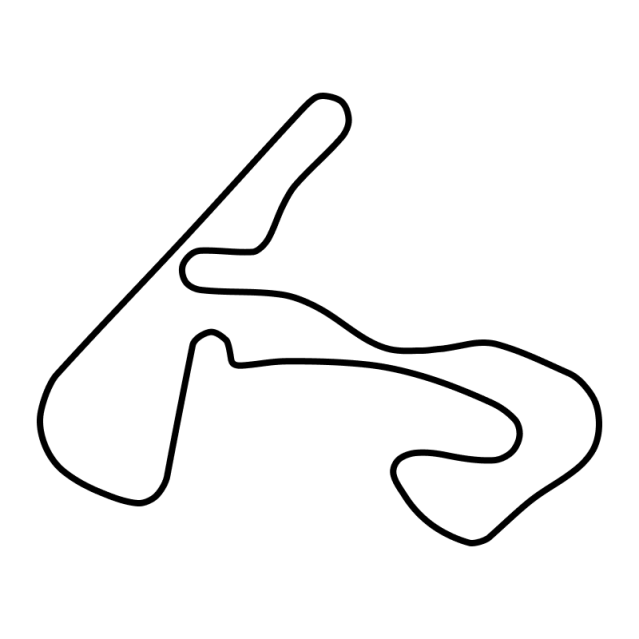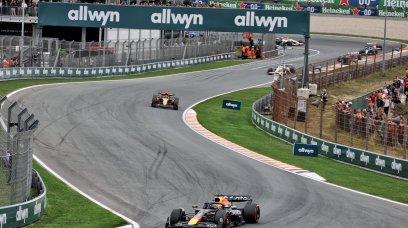Dutch GP
Circuit Zandvoort- Free practice 1 FP1 21 Aug 2026 -
- Sprint qualifying Shootout 21 Aug 2026 -
- Sprint race Sprint 22 Aug 2026 -
- Qualifying Quali 22 Aug 2026 -
- Race Race 23 Aug 2026 -
The Dutch Grand Prix returned to the F1 calendar in 2021 after a 36-year absence, and the Zandvoort circuit – which has been completely re-worked – will host the event for the final time (for now) in 2026.
Stats
| First held | 1952 |
| Laps | 72 |
| Circuit length | 4.259 kilometres |
| Lap record | 1:11.097 (2021) |
| Winner in 2025 | Oscar Piastri |
| Second in 2025 | Max Verstappen |
| Third in 2025 | Isack Hadjar |
Winners
| Winner 2025 | Oscar Piastri |
| Winner 2024 | Lando Norris |
| Winner 2023 | Max Verstappen |
| Winner 2022 | Max Verstappen |
| Winner 2021 | Max Verstappen |
| Winner 1985 | Niki Lauda |
| Winner 1984 | Alain Prost |
F1 Dutch GP | Zandvoort | Date, Schedule & Start Time
The popularity of Max Verstappen surely meant it was only a matter of time before a race in the Red Bull driver's native country would be reinstated.
Having last held the Dutch Grand Prix back in 1985, the Zandvoort track has been newly configured in order to meet the demands of the modern Formula 1 car.
The result is a 14-turn 4.259km layout, which features two DRS zones as well as a number of banked corners and elevation changes, especially at the beginning of the lap.
When is the 2026 Dutch Grand Prix on the F1 calendar?
The F1 Dutch Grand Prix is scheduled to take place on the weekend of 21-23 August, and is set to be the 14th race of the Formula 1 season.
It is set to be final time Zandvoort hosts a race for the time being, as it will exit the calendar for 2027.
As it celebrates its final appearance, the weekend will be run under the sprint format.
F1 Start time of the 2026 Dutch Grand Prix
The Dutch Grand Prix starts on Sunday 23 August at 14:00 BST. The race can be followed live on RacingNews365's blog.
F1 schedule Dutch GP
| Session | Date | Time |
|---|---|---|
| Free practice 1 | Friday 21 August | - |
| Sprint qualifying | Friday 21 August | - |
| Sprint race | Saturday 22 August | - |
| Qualifying | Saturday 22 August | - |
| Race | Sunday 23 August | - |
History of the F1 Dutch GP | Zandvoort
Located in the dunes of Holland's North Sea coastline, half an hour from Amsterdam, Zandvoort hosted minor races on street circuits in the 1930s.
Following the Second World War, roads were widened and linked together and, as a result, a circuit was designed. Initially attributed to the efforts of John Hugenholtz, the decision was undertaken by the Royal Dutch Motorcycle Association on advice from Sammy Davis, who had won the 1927 24 Hours of Le Mans.
The first race took place in 1948 under the name of the Zandvoort Grand Prix, with Thailand's Prince Bira taking the chequered flag. Louis Rosier won in 1950 and 1951, while the Dutch Grand Prix finally became part of the F1 World Championship in 1952.
Alberto Ascari won that year, as well as taking victory at the race in 1953. The event wasn't held in 1954, 1956 and 1957 owing to financial issues, with Mercedes dominating in 1955 with their drivers Juan Manuel Fangio and Stirling Moss.
Jim Clark won on four occasions in the 1960s (1963, 1964, 1965 and 1967) while driving for Lotus. The 1970 Dutch GP was won by Jochen Rindt in a Lotus, but the race is remembered for Piers Courage's accident. Driving the Frank Williams Racing car, the Briton crashed and was killed after a wheel came off and hit him on the head. With Courage still in the car, it caught fire and burned to the ground.
Redeveloped Zandvoort circuit
Although the Dutch GP was initially included in the 1972 F1 calendar, drivers refused to race at Zandvoort given that the facilities and circuit had fallen out of date.
Extensive modifications were made as a result, including the building of a new pit lane, and this resulted in a positive atmosphere when Formula 1 returned in 1973.
Unfortunately things went very wrong on race day, with disorganisation and a lack of clear communication contributing to the events of that day. Roger Williamson, in what was his second F1 race, crashed heavily near Tunnel Oost, with his car catching fire while scraping along the tarmac.
The Briton was unable to free himself from the car, which resulted in David Purley stopping alongside him to turn the burning March over. Try as he might, Purley wasn't able to do much, while the marshals - who weren't wearing flame retardant overalls - weren't able to help either due to the intense heat.
Race control assumed it was Purley's car that had crashed and that he had escaped unharmed, while fellow drivers failed to stop as they didn't know that a second car had been involved. Williamson died from asphyxiation.
Purley was awarded a George Medal for his actions, while Tyrrell driver Jackie Stewart won ahead of teammate Francois Cevert.
James Hunt claimed his first F1 win at the 1975 Dutch Grand Prix, while Mario Andretti's last victory in the series came at Zandvoort in 1978.
Alain Prost kicked off a run of four straight wins for French drivers in 1981, with Didier Pironi, Rene Arnoux and Prost, again, taking the chequered flag in the years that followed. Niki Lauda won in 1985, the race's final running after track owner CENAV went out of business.
F1 Dutch GP returns to the calendar
On 14 May 2019, it was announced that Formula 1 would return to Zandvoort for the 2020 season.
Unfortunately that return was pushed back, as the race was postponed and later cancelled due to the COVID-19 pandemic.
The Dutch Grand Prix finally made its return to Zandvoort in September 2021, much to the delight of Max Verstappen's fans.
Most successful F1 drivers and teams
Jim Clark leads the way in terms of wins in the Netherlands, having been victorious at the Dutch GP on four occasions. He is followed by Jackie Stewart, Max Verstappen and Niki Lauda, who each have three wins.
In terms of constructors, Ferrari top the list with eight victories to their name, followed by Lotus on six and McLaren and Red Bull on three wins.
Don't miss out on any of the Formula 1 action thanks to this handy 2026 F1 calendar that can be easily loaded into your smartphone or PC.
Download the calender
